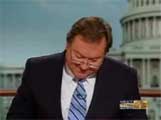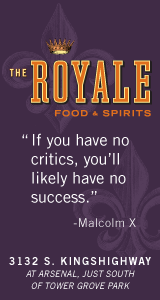By Antonio D. French
Filed Tuesday, October 31, 2006 at 2:48 PM
Exactly one week before Election Day, a new CNN poll shows the race between Republican Jim Talent and Democrat Claire McCaskill tied. Labels: U.S._Senate_Race
Jim Talent - 49%
Claire McCaskill - 49%
(Sampling Error: +/- 4%)
Of the larger pool of 1,004 registered voters, McCaskill led with 51% to Talent's 43%. Click here to download the PDF of the 3-page report from CNN's polls of Missouri, New Jersey, Ohio, Tennessee, and Virginia voters.










9 Comments:
Similar Poll one week before election 2002 - Talent lead then US Senator Jean Carnahan by >5%. Election Day resulted with Talent winning the race by only 20,000 votes state-wide.
10/31/2006 3:48 PM
I think the gap between "registered" and "likely" voters is very telling. For both sides it's all going to come down to turn-out. And turn-out in a mid-term election is much tougher for Democrats than Republicans.
And let's not even talk about the weather factor!
10/31/2006 4:00 PM
I wish the poll stated how it filtered "likely" voters from registered voters.
10/31/2006 4:27 PM
Plus, whenever it's a split poll, the incumbent wins. Not a good sign for Claire.
Minimum wage will hopefully turn out a Dem base, but will the stem-cell battle turn out the Fundies for Jimbo?
10/31/2006 4:28 PM
Likely voters are filtered from registered voters thusly: the list used to make the calls is from a list of registered voters. The caller asks at the beginning of the interview how likely the respondent is to vote. If they say they are "very" or "Quite" likely to vote, they are categorized as a "likely" voter. Everyone else -- those who say they are "somewhat" or "not" likely to vote are not included in the universe of "likely" voters, but are included as "registered" voters.
10/31/2006 5:55 PM
Survey USA has a new poll out today that shows McCaskill up 49-46%. http://www.surveyusa.com/client/PollReport.aspx?g=f5a2300c-8c54-4566-ba53-7253b699ab36&c=82
10/31/2006 5:57 PM
In addition to the "how likely is it that you will vote?" question, pollsters often ask a question like "how closely are you following/how interested are you in the race?"
Pollsters then may apply the responses to the responses in previous similar elections at similar points in the cycle in order to model who actually will turn out. Obviously, this is very much an art, and different pollsters subscribe to different methods.
I should note, however, that as polls that model likely voters draw near the actual election day, their likely voter model usually becomes more accurate. This is because pollsters are able to fine-tune the model as to who actually is likely to vote. (When you see a "likely voter" poll a month or two before the actual election, it's best to read the result less as a predictive piece of information and more as a piece of information regarding general voter allegiance and motivation.)
These pollsters aren't trying to fool us; they merely are subscribing to a certain likely voter model they think is most accurate.
I agree with Antonio that this race will come down to turnout. But then again, don't they all? ;)
11/01/2006 8:21 AM
Folks The state dose not keep track of who you vote for but it dose keep track of if you vote or not.
So, a large factor in making up the likly voter group is how frequently the person votes. A person that only has voted in presidential elections is not as likly to vote in this election.
On the other hand a person that has voted in some primarys or mid term elections are more likly to vote.
11/01/2006 11:07 AM
Right. I forgot to add that the poll-giver may ask whether you voted in 2002, 2000, ect. in order to help model the likely voter pool.
I doubt, however, that pollsters will look up how often you have voted in a database. Those asked to partcipate in polls are randomly selected, and simply asking the questions of whether you are registered and how frequently you have voted in the past suffices in the aggregate.
It's also worth noting that some pollsters may not agree with the notion that a person's past frequency of voting necessarily increases the likelihood of a person's voting in a particular election. Some pollsters will put more weight upon the current level of interest/excitement for a particular person, and a bit less weight on past frequency of voting. Still, both factors often come into play when modeling turnout.
11/01/2006 11:52 AM
Post a Comment
<< Home